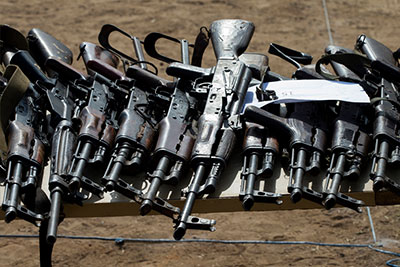
Multilateral disarmament forums continued to struggle in this reporting period to deliver results, although there were some breakthroughs and reasons for optimism.
The international community came together to ensure the rapid and verified elimination of Syrian chemical weapons. The Joint Mission of the Organization for the Prohibition of Chemical Weapons (OPCW) and the United Nations for the Elimination of the Chemical Weapons Programme of the Syrian Arab Republic completed its mandate and drew to a close on 30 September 2014. This effort was, in many ways, a bright spot amid truly dark circumstances. Challenges remain on some outstanding issues, which need to be addressed by the Syrian authorities in cooperation with OPCW. The Office for Disarmament Affairs continues to engage with OPCW and the Syrian authorities on the remaining work, and to keep the Security Council briefed, on issues relating to the implementation of resolution 2118 (2013). The OPCW fact-finding mission on allegations of the use of toxic chemicals as weapons in the Syrian Arab Republic also continued its work. Concerns regarding the increasing number of such allegations were reflected inresolution 2209 (2015), in which the Security Council expressed support for the continuing work of the OPCW fact-finding mission and, inter alia, stressed that those responsible for any use of chemicals as weapons must be held accountable.
Humanitarian approaches to disarmament saw momentum in the reporting period. I am particularly encouraged by the growing interest in addressing the humanitarian, legal, military and ethical dimensions of autonomous weapon systems and other emerging technologies under the auspices of the Convention on Certain Conventional Weapons. I commissioned a study on armed unmanned aerial vehicles, which included a focus on humanitarian and human rights issues related to their use. The Vienna Conference on the Humanitarian Impact of Nuclear Weapons, held in December 2014, contributed to growing awareness of the risks posed by nuclear weapons. Such conferences deepen our knowledge of the risks of use and the fundamental challenges to our emergency response capability. The more we understand about the humanitarian impacts, the more it becomes clear that we must pursue disarmament as an urgent imperative. The United Nations also continued to support the Anti-Personnel Mine Ban Convention and the Convention on Cluster Munitions.
I deeply regret the inability of the 2015 Review Conference of the Parties to the Treaty on the Non-Proliferation of Nuclear Weapons to reach consensus on a substantive outcome. While increasing international tension demonstrates the need for tangible progress in nuclear disarmament, a wide gap persists on how to move this agenda forward. States must not let this setback stop the momentum they have built in recent years for new initiatives in the pursuit of nuclear disarmament and continuing efforts to strengthen nuclear non-proliferation.
In the field of conventional arms regulation, we saw the rapid entry into force of the landmark Arms Trade Treaty, on 24 December 2014. This is a testament to the collective will of the international community to put an end to the irresponsible transfers of conventional arms and their diversion. Unregulated arms transfers to conflict zones, terrorists and organized crime groups should be a thing of the past. For the Arms Trade Treaty to be truly effective, universal participation in the treaty — as well as rigorous implementation by all — are essential.
More sobering was the continuing inability — after 19 years — of the Conference on Disarmament to overcome its differences and agree on a programme of work that would allow for the resumption of substantive negotiations. I call again on the Conference on Disarmament to rise to the challenge and live up to its mandate as the world’s single negotiating forum for multilateral disarmament.
As a concrete first step towards revalidating its relevance, the Conference should start to conduct substantive work on the basis of an agreed programme of work, including by heeding the recommendations of the group of governmental experts with respect to a ban on the production of fissile material for nuclear weapons or other explosive devices. I look forward to an early beginning of negotiations on this ban, which is an important step towards a world free of nuclear weapons.
I regret to see that, despite tireless efforts by the facilitator, little progress was made on bringing the States of the Middle East together to find agreement on how to free the region of nuclear weapons and all other weapons of mass destruction. I continue to stand ready to support efforts to promote and sustain the inclusive regional dialogue necessary to achieve this goal.
Finally, the United Nations responded to an increasing number of requests from Member States to support strengthening of national capacities to fulfil their obligations under multilateral disarmament treaties and other instruments.
